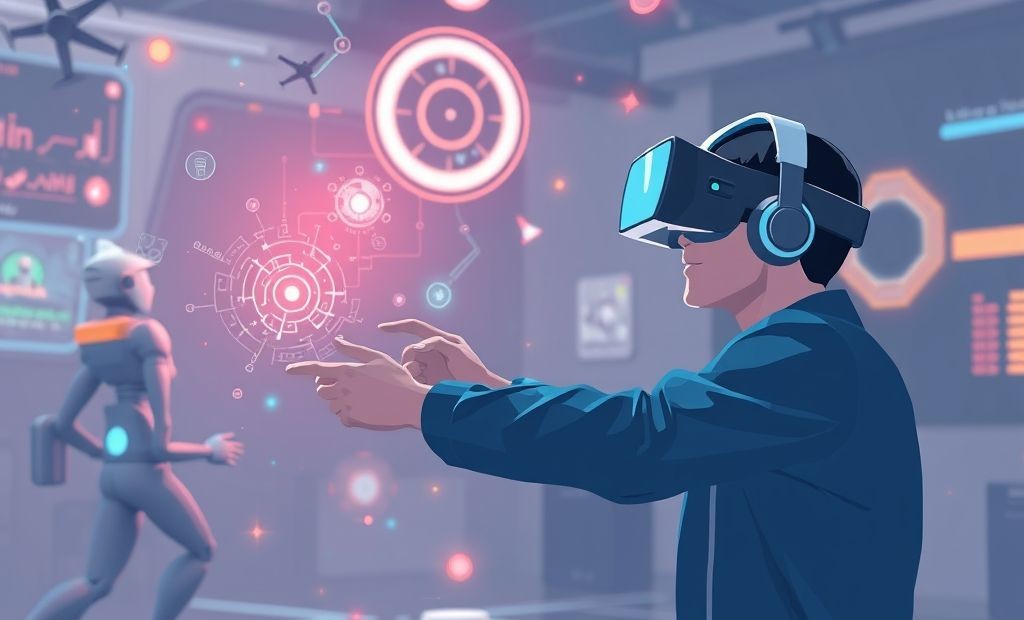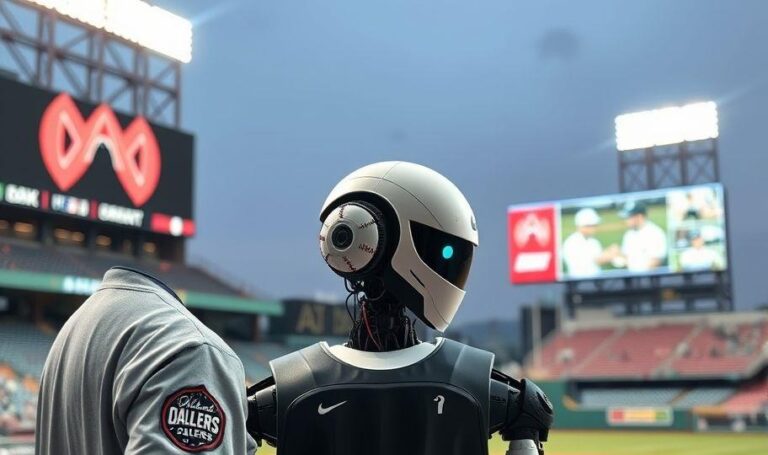AI Enhancements in Virtual Reality Gaming

AI Enhancements in Virtual Reality Gaming: A New Reality Virtual Reality (VR) gaming is rapidly evolving, and Artificial Intelligence (AI) is at the forefront of...
⏱️ Estimated reading time: 3 min
Latest News
AI Enhancements in Virtual Reality Gaming: A New Reality
Virtual Reality (VR) gaming is rapidly evolving, and Artificial Intelligence (AI) is at the forefront of this revolution. AI is no longer a futuristic concept; it’s actively shaping the immersive experiences we enjoy in VR. This article explores how AI is enhancing VR gaming, making environments more responsive, engaging, and unbelievably realistic.
The Role of AI in VR Gaming
AI plays a crucial role in various aspects of VR gaming, significantly improving the overall player experience. From creating dynamic environments to developing intelligent Non-Player Characters (NPCs), AI’s influence is undeniable.
Responsive and Dynamic Environments
AI algorithms enable game developers to create VR environments that react to player actions in real-time. Here’s how:
- Adaptive Scenery: AI algorithms adjust the environment based on player interaction, creating a dynamic world that feels alive. For example, if you knock over a vase, the AI can trigger a realistic shattering effect and adjust the surrounding environment.
- Procedural Content Generation: AI can generate entire landscapes, buildings, and other environmental elements, reducing development time and creating diverse and unique VR worlds. Tools like Autodesk AI and Unity AI enable developers to implement this.
- Weather Effects: Implementing complex weather systems powered by AI, allowing the game to dynamically adjust weather conditions, like intensifying a storm based on player location.
Intelligent NPCs
AI breathes life into NPCs, making them more believable and interactive:
- Realistic Behaviors: AI-driven NPCs exhibit more realistic behaviors, making them feel like actual inhabitants of the VR world. They can react to player actions, have unique personalities, and even learn from their interactions. DeepMind is at the forefront of AI research that informs realistic NPC behavior.
- Dynamic Dialogue: AI powers dynamic dialogue systems, allowing NPCs to respond to player questions and comments in a more natural and engaging way.
- Adaptive Difficulty: AI can adjust the difficulty of encounters based on the player’s skill level, providing a challenging but fair gaming experience.
Enhanced Immersion Through AI
Immersion is key to a great VR experience. AI significantly boosts immersion by:
Realistic Physics and Interactions
AI-powered physics engines allow for more realistic interactions within the VR environment:
- Object Manipulation: Picking up, throwing, and manipulating objects feels more natural and responsive.
- Collision Detection: Improved collision detection ensures that objects interact realistically with each other and the environment.
Personalized Gaming Experiences
AI algorithms can analyze player behavior and preferences to create personalized gaming experiences:
- Adaptive Storylines: The game can tailor the storyline based on player choices and actions.
- Customized Challenges: AI can create challenges that are specifically designed to test the player’s skills and abilities.
AI Tools and Technologies Used in VR Gaming
Several AI tools and technologies are instrumental in creating these enhancements:
- Machine Learning (ML): ML algorithms learn from data to improve NPC behavior, create realistic environments, and personalize the gaming experience.
- Natural Language Processing (NLP): NLP enables NPCs to understand and respond to player speech, making interactions more natural and engaging.
- Neural Networks: Neural networks are used to create realistic animations, generate textures, and improve the overall visual quality of VR games.
Code Example: AI NPC interaction in C#
public class AIController : MonoBehaviour
{
public float awarenessRadius = 10f;
public float reactionTime = 2f;
private GameObject player;
private bool playerDetected = false;
void Update()
{
DetectPlayer();
if (playerDetected)
{
ReactToPlayer();
}
}
void DetectPlayer()
{
// Simplified player detection based on distance
if (Vector3.Distance(transform.position, player.transform.position) <= awarenessRadius)
{
playerDetected = true;
Debug.Log("Player Detected!");
}
else
{
playerDetected = false;
}
}
void ReactToPlayer()
{
// Implement reaction logic here (e.g., attack, flee, interact)
Debug.Log("Reacting to Player!");
}
// Initialize Player
void Start()
{
player = GameObject.FindGameObjectWithTag("Player");
}
}
The Future of AI in VR Gaming
The future of AI in VR gaming is incredibly promising. Expect to see even more sophisticated AI algorithms that create even more realistic and immersive experiences. Consider OpenAI developments, Google AI platform, and other similar tools which boost AI and gaming technologies.
- More Realistic Graphics: AI can be used to generate even more realistic graphics, blurring the line between the virtual and real worlds.
- Enhanced Social Interactions: AI can facilitate more natural and engaging social interactions within VR environments, making online gaming more immersive and enjoyable.
- AI-Driven Storytelling: AI can create dynamic and branching storylines that adapt to player choices, providing a truly unique and personalized gaming experience.
Final Overview
AI is transforming VR gaming, making environments more responsive, NPCs more believable, and experiences more immersive. As AI technology continues to evolve, we can expect even more groundbreaking advancements that will revolutionize the way we play and interact in virtual worlds. Get ready to experience a new reality!
Related Posts

Luminal’s $5.3M Boost: Revolutionizing GPU Code
Luminal Secures $5.3M to Advance GPU Code Framework Luminal has successfully raised $5.3 million in...
November 17, 2025

AI Takes the Field Oakland Ballers’ Bold Experiment
Oakland Ballers Bet on AI A Risky Play? The Oakland Ballers a team in the...
September 22, 2025

Hike Shuts Down Amidst Gaming Regulations in India
Hike Shuts Down Amidst Gaming Regulations in India Hike, once a prominent unicorn in India’s...
September 14, 2025











Leave a Reply